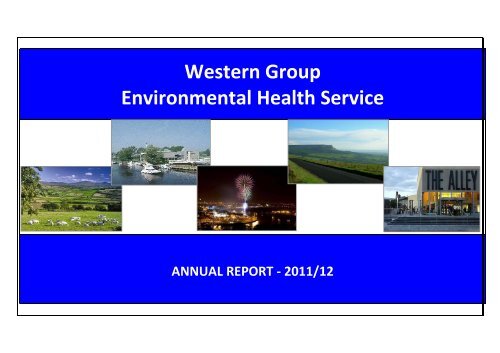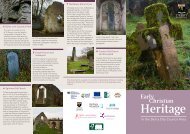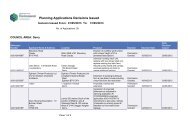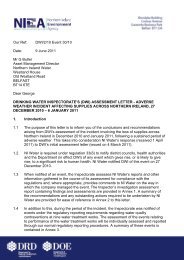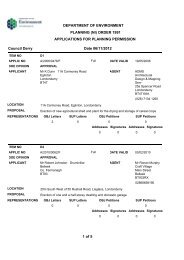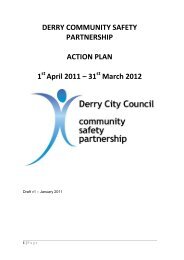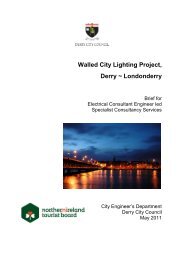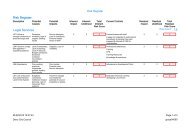Western Group Environmental Health Service - Derry City Council
Western Group Environmental Health Service - Derry City Council
Western Group Environmental Health Service - Derry City Council
- No tags were found...
Create successful ePaper yourself
Turn your PDF publications into a flip-book with our unique Google optimized e-Paper software.
NI have exactly the statutory, quality management, role that Professor Lofstedt envisaged for the HSE and deliver the desired outcomes in termsof effective enforcement and efficient policy-making.Better Regulation has become a widely used term in recent years and has seen politicians of all parties and departments and sections withingovernment departments take strong positions suggesting and supporting the view that there is a need for radical reviews of legislation on theone hand, and also for changes to the way regulators enforce legislation. All regulators, of whatever type, seem to be considered to operatewithin a “tick box” culture, to be over-zealous, to misunderstand the needs of businesses. As a result of this development, central governmentdepartments are reviewing regulations with a view to reducing the burden on business and at the same time standards for enforcementpractice are being reviewed with recommendations that the regulators should ensure that they provide advice on compliance, are transparentand proportionate in their requirements of businesses and consistent in their application across all businesses. Without wishing to make anyclaims that the <strong>Environmental</strong> <strong>Health</strong> <strong>Service</strong> is better or worse than any other regulator, it clear that, almost universally, the service adopted allof these standards in their initial form in the early 1990s, formalised them by adoption of the Enforcement Concordat in the late 1990s andmore recently also by incorporating the requirements of the Regulator’s Compliance Code into council policies and procedures.It is evident that for the majority of <strong>Environmental</strong> <strong>Health</strong> Officers in Northern Ireland the principles of Better Regulation have been in place sincebefore their careers started. It is accepted that staff employed in regulatory functions are human, errors will occur and some variation in approach willbe inevitable. That is why arrangements are put in place to provide policy and procedural documents, to monitor standards of advice, education andenforcement, to help officers to make judgements that are as far as possible consistent with those of their colleagues in the same situation. NorthernIreland has these arrangements in place by virtue of the cross linkages between environmental health staff working in the <strong>Group</strong> system and thoseworking in the District <strong>Council</strong>s. They do not need Better Regulation that is merely re-badged Old Regulation but merely some stability to continue toprovide the standard of service that for them has always been the norm.Alderman Jack RankinChairman of <strong>Western</strong> <strong>Group</strong> Committee 2011-124
ELECTED MEMBERS AND STAFF.WESTERN GROUP ENVIRONMENTAL HEALTH COMMITTEE .The <strong>Group</strong> Committee, comprised of elected membersdrawn from each of our constituent District <strong>Council</strong>s,is the statutory body charged with co-ordination andmonitoring of environmental health services acrossthe area of the five district councils.The Committee sanctions the work and approves plansand initiatives undertaken by <strong>Group</strong> environmentalhealth staff, whilst providing democraticaccountability and giving feedback on what we havedone.Members .as at 31 March 2012Chairman .Alderman J Rankin MBE [Limavady Borough <strong>Council</strong>]Vice Chairman .<strong>Council</strong>lor S Clarke [Omagh District <strong>Council</strong>]The staff of <strong>Western</strong> <strong>Group</strong> <strong>Environmental</strong> <strong>Health</strong><strong>Service</strong> are grateful to those <strong>Council</strong>lors who gave uptheir time during the reporting year to serve on the<strong>Group</strong> Committee to provide policy approval anddirection for the <strong>Group</strong>.The Committee met on four occasions during thereport period – 21 st June, 6 th September and 6 thDecember 2011, and 6 th March 2012.Alderman Mary Hamilton<strong>Council</strong>lor Hugh Hastings<strong>Council</strong>lor Brian McCaffrey<strong>Council</strong>lor Basil Johnston<strong>Council</strong>lor Gerry Mullan<strong>Council</strong>lor Errol Thompson<strong>Council</strong>lor Allan Bresland<strong>Council</strong>lor Michelle McMackin[<strong>Derry</strong> <strong>City</strong> <strong>Council</strong>][<strong>Derry</strong> <strong>City</strong> <strong>Council</strong>][Fermanagh District <strong>Council</strong>][Fermanagh District <strong>Council</strong>][Limavady Borough <strong>Council</strong>][Omagh District <strong>Council</strong>][Strabane District <strong>Council</strong>][Strabane District <strong>Council</strong>]Clerk and Chief ExecutiveMr Daniel McSorley5
WESTERN GROUP ENVIRONMENTAL HEALTH SERVICEStaff - 2011/12GROUP CHIEF EHOBarny HeywoodADMINISTRATIONEMERGENCYPLANNINGENVIRONMENTALPROTECTIONFOOD CONTROL,INFECTIOUS DISEASEHEALTH PROMOTIONHEALTH & SAFETY,CONSUMERPROTECTION,ANIMAL WELFAREHOUSING,TRAINING,PUB. HEALTH & REG,POLICYWATERQUALITYAdmin ManagerRenée GoudieSenior Clerical OfficersCatherine McCormack (50%)Roisin BroganClerical OfficerEmma MooreEmergency PlanningCo-ordinationOfficerJoan McCaffrey<strong>Group</strong> PrincipalEHORaymond Smyth<strong>Group</strong> EHOKieran Shanks<strong>Group</strong> Principal EHOLarry Dargan<strong>Group</strong> Senior EHO/TempAileen BrowneGenevieve McWilliams<strong>Group</strong> EHO/TempsGail RobinsonEimear O'KaneTobacco ControlEnforcementOfficers/TempsDiane Kells, Jane GourleyAnita McKennaMark McCannSmoking CessationOfficersBrigid McAleerSonya Slevin<strong>Group</strong> Principal EHOClement Kennedy<strong>Group</strong> EHO (CP)Barbara AnneMcMullanAnimal WelfareOfficerKaren Kerr-George<strong>Group</strong> Principal EHOIan Giboney<strong>Group</strong> EHODeborah BeavisStudent EHOsFERMANAGHDeirdre Spillane, SWQIMichael Spillane, WQIGerry Blake, WQIJohn Gilmore, WQOSinead Hurson, Temp WQOOMAGH/STRABANEStephen Annesley, WQISam McCracken, WQI (O/F)Denise Turner, WQIGavin Turner, WQIDERRY/LIMAVADYMairead Clarke, WQIConrad McCormick, WQIAlan Warwick, WQISimon Gummer, WQONicole McArthur, WQO[ WQIs act up as SWQIson rota basis ]6
WHAT WERE OUR KEY OBJECTIVES?<strong>Western</strong> <strong>Group</strong> <strong>Environmental</strong> <strong>Health</strong> <strong>Service</strong> employs experienced and specialist staff whose services in direct support of council departments areshared across the five constituent councils providing economies of scale. This cost-effective provision of skills across the group area also provides anucleus for specialised groups that operate regionally across the whole of Northern Ireland and also more locally, generating advice for councils onpolicy, technical responses to problems and consultations. They assist in development of best practice for the <strong>Environmental</strong> <strong>Health</strong> <strong>Service</strong> andpromote consistency in enforcement practice whilst providing clear conduits for liaison with central government departments, national regulators anda range of other organisations.The Aim of <strong>Western</strong> <strong>Group</strong> <strong>Environmental</strong> <strong>Health</strong> <strong>Service</strong> is to improve the health, the well-being and the environment of the population within the fiveDistrict <strong>Council</strong> areas of <strong>Derry</strong>, Fermanagh, Limavady, Omagh and Strabane.An overarching objective for <strong>Western</strong> <strong>Group</strong> staff is to support and assist the five District <strong>Council</strong>s to provide high quality and consistent environmentalhealth services to their communities; but this may be better defined by a number of more specific objectives:a. To provide direct assistance to council departments and their staff across the broad subject areas of environmental healthb. To provide advice to councils and staff on best-practice in the enforcement of environmental health legislation and in tasks relevant to thepromotion of health and to monitor the standards maintained.c. To develop policies and working practices that assist <strong>Council</strong>s to provide services meeting public demand for high standards and consistentpractice.d. To provide a link to external organisations, government departments and other agencies so that the <strong>Environmental</strong> <strong>Health</strong> <strong>Service</strong> cancommunicate as a coherent professional body and can negotiate as a voice for 26 councils.To achieve these objectives members of the group team liaise closely with colleagues across the five district councils within the group area but alsowork in partnership with the other group environmental health committees in Northern Ireland as well as with Belfast <strong>City</strong> <strong>Council</strong>. In forging workingrelationships with these organisations we achieve the statutory requirement that we drive consistency not only within the councils in this <strong>Group</strong> areabut across the other group areas in Northern Ireland. By utilising skills and expertise wherever these may be found within the wider service, we help7
ensure effective interventions, gain economies of scale and promote shared objectives that will benefit the health of all our communities. <strong>Western</strong><strong>Group</strong> <strong>Environmental</strong> <strong>Health</strong> <strong>Service</strong> forms an intrinsic part of the environmental health service in Northern Ireland.In addition to the general activities described above, <strong>Western</strong> <strong>Group</strong> identified a number of specific matters to be addressed during the year:-<strong>Environmental</strong> Protection Maintaining effective regulation of installations prescribed under Part C of the Pollution Prevention and Control Regulations (NI) 2003, and with theintroduction of the risk based charging scheme, ensuring consistency of risk classification within and between districts; Continuing to address contaminated land issues through the planning (development control) process; Agreeing noise conditions for inclusion in the new Planning and Noise guidance and monitoring the operation of the ePIC system for <strong>Environmental</strong><strong>Health</strong> departments as consultees (interactive online planning system); Organising of training for the range of new environmental protection powers introduced by the Clean Neighbourhoods and Environment Act (NI)2011.Food Control Continue to work with PHA to further develop appropriate and standardised protocols for the investigation of infectious disease; Work with other health professionals in DHSSPS, FSANI and Public <strong>Health</strong> Agency and <strong>Health</strong> & Social Care Trusts to focus on reducing incidence ofListeria in vulnerable groups; Consider the FSAA evaluation of the pilot nutrition award, discuss future roll out with CEHOG and district council colleagues; Work with business to advise (and subsequently enforce) the pending vending machine regulations; Continue to support <strong>Western</strong> <strong>Group</strong> councils (in particular Limavady BC who plan to join this year) and also give assurance of a consistent, groupand NI wide approach.<strong>Health</strong> and SafetyTo significantly reduce the number of work-related fatalities, injuries and cases of ill health in Northern Ireland by: Ensuring that Northern Ireland’s health and safety at work regulatory system operates as effectively as possible, supporting businesses andreducing regulatory burdens; Focusing on the core aspects of workplace health and safety in Northern Ireland, thereby promoting sensible and proportionate riskmanagement by all; Targeting District <strong>Council</strong> and HSENI’s resources when appropriate in a manner that maximises each organisation’s ability to prevent harm andsecure justice.8
Work together with HSENI to maximise resources to best effect, via the joint strategic planning framework and a collaborative approach toimplementation through the new joint planning arrangements.Consumer Protection Working with business, community and statutory bodies to implement a joined up approach to consumer protection enforcement acrossNorthern Ireland; Addressing the enforcement of the Construction Products Directive; Supporting and assisting District <strong>Council</strong>s in implementing CEHOG Consumer Protection procedures and other guidance material.Public <strong>Health</strong> and Housing Promoting the wider use of the Private Tenancies Order to address housing standards in rented accommodation Pressing for change in the Housing Fitness Standards Working with the Drinking Water Inspectorate to enforce the new Private Water Supplies RegulationsEmergency Planning Progressing the objectives outlined within the Local Government Emergency Management <strong>Group</strong> Strategy; Developing community resilience pilots throughout the West; Ensure consistency of approach in the delivery of emergency planning throughout the West; Progress the development of the <strong>Western</strong> First Responder <strong>Group</strong>s and its associated sub-groups to allow for the effective planning and response toemergency situations; Validating the First Responders Multi Agency flood plan with the councils and relevant stakeholders.9
Pollution Prevention & Control Regulations (NI) 2003ENVIRONMENTAL PROTECTION .<strong>Western</strong> <strong>Group</strong> supports and assists the 5 constituent councils in the enforcement of the PollutionPrevention and Control Regulations (NI) 2003. The <strong>Group</strong> EHO based in <strong>Derry</strong> CC takes a lead role inthis work in that <strong>Council</strong> area.At the end of March 2012 there were 81 installations across the 5 district council areas subject toregulation by these councils, e.g. combustion processes, large petrol stations, cement processes, coalyards, timber activities and solvent-using processes including dry cleaners. The inspection rate forthese installations, which is dictated by their risk categorisation, was 100% or greater across all 5districts except in the case of a very small number of low risk premises.<strong>Western</strong> <strong>Group</strong> was requested to review the application of the requirements of the legislation on atimber process in one of the districts. This confirmed that the council’s enforcement had beenconsistent and in accordance with the regulations and guidance. The review clarified some of thecontentious issues in relation to this process and set out a route for their resolution.Planning Consultations & LiaisonConsiderable time was spent assisting and supporting all five councils in the assessment ofplanning proposals having potential environmental health implications (e.g. noisedust/odour, land contamination etc) and providing recommendations to Planning NI tocontrol these as appropriate.The range of applications considered included industrial / commercial processes, mineralextraction / processing, energy generation developments, waste management facilitiesand housing developments.10
<strong>Group</strong> Officers made a presentation to representatives of the Planning Appeals Commission for NI on the range of issues which are addressed by<strong>Environmental</strong> <strong>Health</strong> Officers at the planning stage. This highlighted some of the work that had been taken forward through the DOE Planning and EHRegional Liaison <strong>Group</strong>. An invitation has now been received for a similar presentation to be made to all of the Commissioners this September.Sustainability / Climate ChangeAlthough there are ongoing efforts to mitigate climate change principally through reducing emissions, some degree of climate change is now inevitable.Adaptation to climate change – reducing risks and realising opportunities - is therefore required. The <strong>Group</strong> Principal EHO (EP) represents the NI Chief<strong>Environmental</strong> <strong>Health</strong> Officers <strong>Group</strong> (CEHOG) on Climate NI. This is a broad cross-sectoral partnership which aims to increase our knowledge andunderstanding of climate change and focus on adaptation.The DOE, in conjunction with the Climate NI, organised a major conference atGreenmount College, Antrim on 16 th February 2012, on the “Impacts of ClimateChange in Northern Ireland”. The main focus of this event was the Climate ChangeRisk Assessment Report which had been before Parliament in January 2012 andwhich included a chapter on NI.Climate NI are organising another event early in September specifically for localgovernment on adaptation.During 2011/12, Omagh DC in partnership with the Chartered Institute of<strong>Environmental</strong> <strong>Health</strong>, completed a Local Climate Impact Profile (LCLIP). This wasthe first such project to be undertaken in NI. It examined the vulnerability of the<strong>Council</strong> to extreme weather events and climate change and how this might impactupon its ability to deliver services. The LCLIP is the starting point for the creation ofa local climate change adaptation strategy.11
Regional Quality/Consistency and Liaison with other bodiesThe <strong>Group</strong> Principal EHO (<strong>Environmental</strong> Protection) represents <strong>Western</strong> <strong>Group</strong> on the Northern Ireland Pollution <strong>Group</strong> (NIPG). This body provides aforum for professional expertise which aims to provide consistency of enforcement and a quality environmental protection service across NorthernIreland.During 2011/12 a considerable number of consultations/regulations were considered by the NIPG, and responses submitted, including:-• Consultation on air quality plans to meet EU limit values for nitrogen dioxide (NO 2 ) in Northern Ireland• EU Review of Air Quality Policy• Proposed amendments to the Pollution Prevention and Control Regulations (NI) 2003 and revised guidance onthe Waste Incineration Directive.• The <strong>Environmental</strong> Offences (Fixed Penalties) (Miscellaneous Provisions) Regulations (NI) 2012• <strong>Environmental</strong> Governance in NI - Discussion Document• Guidance to District <strong>Council</strong>s on audible Intruder Alarms, the Noise Act 1996 and Statutory Nuisances• Code of Practice on Odour Nuisance from Sewage Treatment Works• The Statutory Nuisance (Appeals) Regulations (NI) 2012• The Statutory Nuisance (Insects) Regulations (NI) 2012• The Statutory Nuisances (Artificial Lighting) (Designation of Relevant Sports) Order (NI) 2012• Draft Planning (<strong>Environmental</strong> Impact Assessment) Regulations (NI) 2012• Review of EC F-gas Regulation (EC/842/2006).The NIPG also maintained liaison arrangements with Planning NI, the Planning and Environment Policy <strong>Group</strong> of DOE, Industrial Pollution InspectorateNIEA, and Land Resource Management Unit NIEA in relation to issues of mutual concern.During December 2011 NIPG members met with Moy Park who facilitated visits to a range of poultry units to provide an updated understanding of thepotential for noise and odour impacts and their control. Guidance for <strong>Council</strong>s on assessing planning applications for such developments will beinformed by these visits.12
TrainingThe Clean Neighbourhoods and Environment Act (NI) 2011 came into force on 1 st April 2012 and contains a range oflegislative measures to improve the quality of the local environment. A large element of work for the NIPG in2011/12 was provision of training in preparation for the introduction of this legislation.The following courses were arranged:-• Statutory nuisance training• Noise Act seminar• Light nuisance trainingNIPG members are currently reviewing existing procedures and notices with the advent of the new powers.The increasing number of wind turbine applications being received also necessitated guidance and training for <strong>Environmental</strong> <strong>Health</strong> staff to ensureproper and consistent assessment. This was prepared and delivered 'in-house' by members of the NIPG.Contaminated land training on site investigations was arranged in the autumn of 2011. This was attended by staff from all 5 councils in the west beingavailable at a very competitive rate by virtue of <strong>Group</strong>'s membership of CIRIA.Fluorinated Greenhouse Gases (F-gas) and Ozone Depleting Substances (ODS) Regulations EnforcementRegulations are in place to reduce emissions of F-gases and ODC from refrigeration, air conditioning and fireprotection equipment. To ensure that enforcement activity in respect of the regulations is focused on the mainpotential emitters, DOE retained F-Gas Support to carry out a study in Northern Ireland. This found that the 5 mainrefrigeration/air conditioning contractors in NI, and some 80 smaller refrigeration companies, are all certified asrequired.The 12 top emitters have been written to regarding their obligations. Other premises are being further investigated.In due course premises that do not demonstrate compliance will be visited by <strong>Environmental</strong> <strong>Health</strong> staff.13
MonitoringMonitoring of <strong>Environmental</strong> <strong>Health</strong> services provided by the districts remains an important function of <strong>Group</strong>. This takes several forms.• <strong>Group</strong> staff collated and reviewed statistics relating to PPC and noise complaint enforcement.• A PPC risk scoring consistency exercise was also undertaken across all 5 councils in view of the introduction of risk based subsistence charges fromApril 2011.More informal monitoring also takes places during accompanied visits with staff in each of the 5 districts and through the review of reports and otherdocumentation.Contaminated LandPart III, the contaminated land provisions, of the Waste and Contaminated Land (NI) Order 1997 were notimplemented during 2011/12, and in the absence of a driver (eg EC Directive) are unlikely to be introduced inthe near future.There was however some progress with the NIEA Land-Use Database in that it had been updated andarrangements were being made for it to be accessible to councils. This will be an invaluable tool for councilsin dealing with contaminated land through the planning process.One substantial contamination assessment is currently being undertaken voluntarily be a company in the<strong>Derry</strong> CC area and <strong>Environmental</strong> <strong>Health</strong> have had significant involvement at key stages of its progress.14
FOOD SAFETY .FSA Review Team Meets the NI Food <strong>Group</strong>and established.The Food Standards Agency instituted a UK-wide review of the delivery of official controls (how we carry out inspectionsetc) and set up a review team to meet with organisations enforcing food safety legislation to hear their thoughts on thereview. As part of that process the review team travelled from London to Belfast to listen to the concerns of the NI Food<strong>Group</strong>. NI representatives voiced their belief that our devolved administration should be considered separately in thisreview as the arrangements and conditions within NI are well founded due to the way in which the EH service is organisedLaunch of Food Hygiene Rating SchemeThree more <strong>Western</strong> <strong>Group</strong> <strong>Council</strong>s, <strong>Derry</strong> <strong>City</strong>, Strabane and Omagh District <strong>Council</strong>s launched theirschemes in June 2012. Regionally the project was marked with an event in Belfast where the Director of theFood Standards Agency and Barny Heywood as Chair of the NI Chief <strong>Environmental</strong> <strong>Health</strong> Officers <strong>Group</strong> gavetheir thoughts on the benefits that the scheme would bring to consumers in NI. More locally we had a launchspecifically for the <strong>Western</strong> <strong>Group</strong> of <strong>Council</strong>s and local businesses, in the <strong>City</strong> Hotel, <strong>Derry</strong>. This was wellattended by both representatives from <strong>Council</strong>s and from the business community. Seven remaining NIcouncils plan to join the scheme early in 2012/2013.Masters Food Module for EHOsThe EH <strong>Service</strong> joined with colleagues at CAFRE to offer a Masters level module inEuropean Food Law. This course majors on ‘approved’ establishments and is based in theclassroom and also within industry as candidates complete a lot of work within a factorysetting. This is the second year we have been able to offer the course and now haveapprox 30 officers graduating with an advanced qualification in Food Law Enforcement.15
Infectious Disease – Training EventThe Public <strong>Health</strong> Agency came to the west in November to present a half day training event for EHOs who undertake infectiousdisease investigations. The event was well attended with representation from all WG councils and from a variety of corefunctions including food control and health and safety. The attendees heard a number of presentations from Public <strong>Health</strong>Doctors on topics such as management and epidemiology of salmonella, clinical illnesses, management of an outbreak etc.<strong>Western</strong> <strong>Group</strong> councils undertake a number of investigations on behalf of the PHA every year; notifications from the Agencyinclude cases and outbreaks of Salmonella, E.Coli, Hepatitis A and occasionally organisms such as Giardia. Training events like thishelps to keep everyone up to date with new knowledge, information and procedures.New NI Strategy for E.ColiWhen the FSA published new guidance for food businesses on compliance with hygiene standards to minimize risk of E.Colicontamination there was considerable concern within the EH service and within businesses. The new guidance appeared tobe quite onerous and prescriptive and many councils in NI were concerned about the potential impact on their inspectionprogrammes and enforcement strategies. The NI Food <strong>Group</strong> put together a paper for the service that examined all theissues and gave councils a framework to manage the implementation of the new guidance. Additionally the Food <strong>Group</strong>put together a proposal for submission to the FSA in Belfast to support councils as they tried to implement this newstrategy. The bid was for approx £28,000 and proposed the provision of a series of presentations and workshops to businesses to help themunderstand the risks of E.Coli and to incorporate this knowledge into their food safety management systems. The work is planned to begin in summer2012.Level 2 Course for Local Chinese _Catering CommunityStrabane and Omagh District <strong>Council</strong>s joined together to offer and deliver a CIEH course for local Chineserestaurant operators in the winter of 2011. We had a lot of help and assistance from Karen Scrivens whoacted as an interpreter, and Aileen, Colette and Julie formed the <strong>Environmental</strong> <strong>Health</strong> team for this. Atthe end of the course they had 24 successful candidates. This initiative was a part of our plans to helpbusinesses implement the new Food Hygiene Rating Scheme.16
New Strategy for Food SafetyThis year the NI Food <strong>Group</strong> drafted a new strategy for compliance – this asks councils to focus their attention on those poorer performing businessesby offering specific assistance where needed, or by taking more decisive action to require compliance.The strategy complements the <strong>Council</strong>s’ Food Hygiene Rating Scheme and meets the public expectation that lower performing businesses should beheld to account.The strategy was the subject of much debate within the service and it is important that there is time given to evaluate the impact this will have. It isintended and hoped that this will further raise food safety standards across NI.Infectious Disease Notifications<strong>Council</strong>s across the West have an agreement through the WGEHS, with the Public <strong>Health</strong> Agency to carry out infectious disease investigations on theirbehalf. The table below gives an indication of the type and scale of the notifications and notifications undertaken this year.Notifications & InvestigationsApril 2011 – March 2012Disease DCC FDC LBC ODC SDC TotalCampylobacter 0 0 1 0 0 1Cryptosporidium 3 12 4 11 5 35E. coli 7 3 0 4 3 17Food Poisoning 5 1 0 0 0 6Listeria 1 0 0 0 0 1Salmonella 12 4 3 4 3 26Shigella 0 1 0 0 0 1Total 28 21 8 19 11 87Included in these were particularly unusual E.Coli notifications.17
Though it is frequently difficult to ascertain a source for these notifications the investigations are nonetheless lengthy in some cases and requiressignificant resources from both WG staff and colleagues in councils.E.coli made the headlines across Germany this year with another unusual variant raising serious concern.London Comes to Strabane!Senior representation from the FSA in London came to Strabane DC offices at the invitation of the<strong>Council</strong> Chief EHO Paddy Cosgrove to talk about the new Food Surveillance System. This is an IT systemthat logs details of all samples taken by EHOs in NI. Paddy has a special interest in this as he chairs theNI Computer <strong>Group</strong>. The system has the potential to direct us towards those sampling programmes thatwill have the biggest benefit for the service and consumers.The west was able to use its influence to organise and host this useful meeting as the Chairs of theComputer Users <strong>Group</strong> and the NI Food <strong>Group</strong> are both based here.'QUIT AND GET FIT'Smoking Cessation Specialists Sonya and Brigid teamed up with sports coaches in leisure centres throughout the West to deliverthe 'Quit and Get Fit' Programme. This project offers help to those who want to give up smoking. Candidates receive cessationadvice and support, free gym membership and coaching to help them get healthy.Well done to all those who joined the programme; success rates were as high as 80%.18
CIEH Courses<strong>Western</strong> <strong>Group</strong> remains one of the largest registered training centres for CIEH courses in both health and safety and food hygiene in NI. The tablebelow gives some indication of the range of courses supported through the <strong>Western</strong> <strong>Group</strong> for the current year.CIEH CoursesApril 2011 – March 2012CollegesExternalTutorsTotalLevel 1 Food Safety Awareness in Catering 3 2 5Level 2 Food Safety in Catering 19 128 147Level 2 <strong>Health</strong>ier Food and Special Diets 0 13 13Level 2 <strong>Health</strong> and Safety in the Workplace 0 14 14TOTAL COURSES 17919
HEALTH AND SAFETY .Visitor attractions involving animals<strong>Western</strong> <strong>Group</strong> has been involved in the past year in a joint partnership with HSENI considering public health Incidents.New guidance on "Preventing or controlling ill health from animal contacts at visitor attractions has been issued. Thisguidance was aimed at owners and managers of visitor attractions who have legal duties under health and safetylegislation as "duty holders" and describes the measures duty holders should take to protect visitors<strong>Western</strong> <strong>Group</strong> staff worked in partnership with HSENI over the past year to organise two information seminars on therevised guidance. One seminar was aimed at industry stakeholders and the other at EHOs and at HSENI Inspectors. These proved very successful withover 150 participants attending.Safe MaintenanceWithin the joint strategy between HSENI and local government launched in February 2011, Safe Maintenance was identified as a priority area forattention from both agencies during 2011-2012. Maintenance was selected as particularly important because one third of all workplace fatalities inNorthern Ireland in 2009-10 were related to maintenance as were a large number of the major and 3-day reportable accidents.Maintenance work can be particularly hazardous as it can often involve dangerous activities such as working at heights, workingwith electricity and with dangerous equipment. It is often done on an ad hoc basis without a proper risk assessment having beencarried out, and a significant amount of maintenance work is undertaken by contractors who are not familiar with the workplace.Training events were organised for officers on 1 st and 10 th June 2011 in relation to the Safe Maintenance campaign. As part of thisjoint maintenance campaign, <strong>Environmental</strong> <strong>Health</strong> Officers from <strong>Western</strong> <strong>Group</strong> councils, and beyond, ensured that 50% ofnormal inspection/investigation activities raised the issue of maintenance safety and any relevant maintenance topic area(asbestos/work at heights/isolation). It is hoped, in these times of economic hardship, that employers will realise that good safemaintenance regimes are a worthwhile investment in health and safety and business terms. Without regular maintenance, thingscan go badly wrong causing death or serious injury.20
Partnership Working – District <strong>Council</strong>s & HSENI<strong>Western</strong> <strong>Group</strong> staff have made a considerable contribution to the substantial progress made in the development of partnership arrangementsbetween HSENI and Local Government HSW enforcement staff. The Partnership structure consisting of a strategic HELANI <strong>Group</strong>, a Planning &Development <strong>Group</strong> and a number of new task and finish joint operational <strong>Group</strong>s covering topic areas such as Legionella, Gas Safety which have beeninstrumental in driving the partnership forward.To link into the new joint planning arrangements with HSENI and reflect the guiding principles within the joint strategic framework, the format of theCEHOG HSLG work programme was revised. The intent of the work programme to provide the means of ensuring the incorporation of joint tasks intocouncil operational plans and then the monitoring of progress against planned actions, targets and outcomes was emphasised.Work with stakeholders other than HSENI was also incorporated – involving subject areas such as sports grounds and fireworks – with actions, targetsand outcomes for each. Joint training, information sharing and opportunities for smarter working practices were also included, as were evaluation andperformance review mechanisms. Progress reports from Belfast, <strong>Group</strong>s and HSENI have become a standing agenda item at HSLG meetings.Lofstedt ReviewIn the past year, <strong>Health</strong> and Safety (GB) has undergone an independent review by Professor Ragnar Löfstedt - Directorof the King's Centre for Risk Management at King's College, London.Professor Löfstedt has made recommendations aimed at reducing the burden of unnecessary regulation on businesseswhile maintaining health and safety performance. The Lofstedt report sets out a number of risk- and evidence-basedrecommendations to reduce regulatory requirements on business where they do not lead to improved health andsafety outcomes, and to remove pressures on business to go beyond what the regulations require, enabling them toreclaim ownership of the management of health and safety.The report highlights the need for a system of health and safety which enables employers to make sensible andproportionate decisions about managing genuine workplace risks. The Government has welcomed the report as itfocused on simplifying and streamlining the stock of regulations, focusing enforcement on higher risk businesses,clarifying requirements, and rebalancing the civil litigation system.21
SunbedsThe NI <strong>Health</strong> & Safety Liaison <strong>Group</strong> has considerable involvement in the preparations for the implementationof the new Sunbed legislation (which comes into effect on 1 st May 2012). This included responding toconsultations, revising draft legislation, and preparing guidance and training for EHOs on the new legislation. Aguidance document for sunbed providers was produced and distributed to approximately five hundred sunbedpremises in Northern Ireland. <strong>Western</strong> <strong>Group</strong> <strong>Environmental</strong> <strong>Health</strong> Departments will be making contact withpremises in the year ahead to ensure compliance with the legislation.Gas SafetyGas Safety continues to be a focus for <strong>Health</strong> and Safety due to the number of fatalities occurring, particularly in relation to CarbonMonoxide poisoning. <strong>Western</strong> <strong>Group</strong> <strong>Council</strong>s have highlighted areas of concern such as the necessity to service and maintain gasappliances. During Inspections, businesses have been encouraged to use only Gas Safe Registered engineers and request a full gassafety check. <strong>Council</strong> websites have recommended installation of an audible carbon monoxide (CO) alarm as a furtherprecautionary measure.Safety at Sports Grounds<strong>Western</strong> <strong>Group</strong> staff and <strong>Environmental</strong> <strong>Health</strong> Officers throughout the five <strong>Council</strong>s continued to undertake monitoring of safety arrangements at alldesignated sports grounds during the past year. A Regional CEHOG Sports Ground group continued to meet to ensure consistency across District<strong>Council</strong>s. In addition, subgroups were established to consider specific issues affecting Soccer and GAA grounds.All designated Sports Grounds were reviewed against standards set for General Safety Certificates in autumn 2011. 95% of all designated grounds willhave either maintained or improved their compliance standards. A number of new draft Guidance Documents prepared by SportNI were consideredthroughout the year before being finalised. In addition, <strong>Western</strong> <strong>Group</strong> staff coordinated two successful desktop review exercises testing contingencyplanning in October 2011 and March 2012. This involved devising realistic scenarios for Soccer and GAA Sports Grounds, and preparing facilitator packsand delegate packs for the exercises.22
Meetings took place with sports ground governing bodies and with emergency services including NIFRS, PSNI and NIAS to ensure appropriateconditions were applied to Certificates. Monitoring checks of Sports grounds were undertaken by officers during games to ensure conditions onCertificates were being implemented.Fireworks<strong>Western</strong> <strong>Group</strong> councils have been involved in ensuring safety of the public in relation to Fireworks byproviding assessment reports to the Department of Justice for applications for both firework display licencesand for registrations (initial and interim) under the Manufacture and Storage of Explosives Regulations(MSER). <strong>Council</strong>s ensured that satisfactory monitoring targets were met with a 100% of display licenceapplications processed, and checks of 75% of displays where special conditions had been attached, 100% ofnew MSER registration requests resulted in an inspection.23
WELFARE OF ANIMALS ACT .<strong>Western</strong> <strong>Group</strong> <strong>Environmental</strong> <strong>Health</strong> <strong>Service</strong>, acting on behalf of Omagh DC and the five councils in the west hascontributed to the implementation phase of a new local government function addressing animal welfare which will takeformal effect on the introduction of The Welfare of Animals Act 2011 in April 2012. The legislation introduces changes tomechanisms for Animal Welfare with enforcement responsibilities for the investigation of allegations of neglect or crueltyinvolving non-farmed animals moving from PSNI to District <strong>Council</strong>s. In preparation for the introduction of the legislation,arrangements were put in place with DARD to employ staff as Animal Welfare Officers, to provide them with training,vehicles, equipment, and administrative arrangements to carry out the role. At the same time, arrangements forveterinary support, stabling and kennelling facilities were also made.An Animal Welfare Project Board covering all councils in NI has been established together with a line managers group to deal with implementation andoperational issues such as the authorisation of officers, procedures for receipt of calls, performance management information and statistical returnsrequired by DARD, assisting the development of memoranda of understanding between DARD and local government and across local government,production of enforcement procedures, enforcement guidance, considering lone working issues, uniforms, equipment, IT, etc.With effect from 1 st April 2012, Omagh DC will take the lead role for the animal welfare project in Northern Ireland from Banbridge BC.QUALITY MANAGEMENT .An audit was carried out by NQA over 2 days in June 2011 of <strong>Western</strong> <strong>Group</strong> and Strabane DC <strong>Environmental</strong> <strong>Health</strong> Departments (representing the<strong>Western</strong> <strong>Group</strong> of councils). The audit found that the service continued to meet the required standards for renewal of the ISO9001:2000 qualitymanagement award for the 8 th time.This continuing achievement contributes to better working practice and to greater consistency across our councils. Staff across the five councils have agrowing awareness of the value of the management system and, as it is increasingly intranet-based, are using the reference systems to locate relevantlegislation and current procedures for specific tasks.24
CONSUMER PROTECTION .Carbon Monoxide Monitors<strong>Western</strong> <strong>Group</strong> <strong>Environmental</strong> <strong>Health</strong> <strong>Service</strong> was involved in the investigation of the safety of carbon monoxide monitors imported by a businesswithin the Limavady Borough. The monitors were sent to a UKAS accredited laboratory in England to confirm that the product did not meet therequirements of EN 50292 and therefore failed to comply with the General Product Safety Regulations 2005.On receipt of an initial sample result indicating failure, a hazard warning was circulated to all 26 councils advising that officersshould visit premises highlighted in the supplier list and as a precaution, should seek voluntary withdrawal of any relevantitems on sale. On subsequent confirmation of the failure, the National Consumer Agency in Dublin was also notified as thereare a number of suppliers in the Republic of Ireland and a Rapex Alert was issued to all enforcing authorities throughoutEurope. An updated hazard warning was then circulated to all 26 District <strong>Council</strong>s in Northern Ireland requesting that officersvisit any premises listed and seek voluntary surrender of all carbon monoxide monitors. This measure will assist us inascertaining how many units have been already supplied to consumers and permit an accurate risk assessment of the needto issue further press releases. The investigation is still ongoing.Toy SafetyWith the increased stocks in local shops and the peak demand for toy purchase being in the period leading up to Christmas, the <strong>Western</strong> <strong>Group</strong><strong>Environmental</strong> <strong>Health</strong> <strong>Service</strong> and our district council colleagues provided advice to consumers on toy safety and also highlighted in local press releaseswhat to consider when purchasing toys for children in order to help prevent accidents at Christmas.New Toy (Safety) Regulations 2011 came into force in August 2011 which strengthened provisions forenforcement and detailed new safety requirements for goods such as toys attached to food, and for parts thatcould choke children. Warnings now have to be more visible and be easy to understand. Officers attended aseminar on 26 th May 2011 in relation to new Toy (Safety) Regulations and <strong>Western</strong> <strong>Group</strong> <strong>Council</strong>s informedsuppliers and retailers of the new regulations via letters, by information on websites and during routine visits.25
Reducing the risk of child strangulation linked to window blind cordsChildren can become entangled in hanging cords when playing, climbing or just exploring. It is estimated that at leasttwo children die every year in such accidents. On the recent introduction of safety requirements for the cords/chains ofwindow coverings, <strong>Western</strong> <strong>Group</strong> Officers issued advisory letters to window manufacturers and blind retailers informingthem that new safety requirements have been introduced across the EU to ensure that internal blinds and other cordedwindow coverings are inherently safe for children, eliminating the risk of strangulation and asphyxiation from accessiblecords and small parts.An article in the Mid-Ulster Mail on 3 rd February 2011 cited a grandfather, Martin Regan from Bellaghy, calling for a banon looped blind cords following the death of his grandson in Tralee last January.Nightwear Safety SurveyIn the past year, <strong>Group</strong> <strong>Environmental</strong> <strong>Health</strong> staff have been involved in the coordination of a survey across the <strong>Western</strong> <strong>Group</strong><strong>Council</strong>s and beyond, looking at the safety of nightwear. Funding was received from the Department of Business, Innovation andSkills (BIS) to carry out this surveillance work which will ascertain compliance with labelling requirements for both adults’ andchildren’s nightdresses.Samples from the <strong>Western</strong> <strong>Group</strong> area and from other <strong>Council</strong>s throughout Northern Ireland were submitted to a laboratory fortesting. The samples that were submitted were broken into 3 x sections, cotton nightdresses, polyester nightdresses & thin cottonpyjamas. There are specific requirements that different garments/ materials must meet in relation to labelling, etc and so a widerange of garments were tested.Twelve samples were purchased on-line, nine of the samples produced a failed result, three of the samples due to labelling issues, the remaining sixwere found to fail to comply with the flammability requirements of the Nightwear (Safety) Regulations 1985. All relevant Local Authorities have beencontacted and the failures are continuing to be investigated. These results however highlight a serious concern with regard to the safety of productsoffered to consumers on-line.26
Part-worn TyresPart-worn tyres are an increasing cause for concern due to the current downturn in the economic climate.Surveys recently carried out throughout the UK have found 100% failure rates in respect of labelling, and30-70% failure rates in matters affecting the safety of these tyres.<strong>Council</strong>s within the <strong>Western</strong> <strong>Group</strong> recognised the safety concerns surrounding part-worn tyres andhighlighted this as a priority work area. During 2011-12 officers within each District <strong>Council</strong> carried outinspections in all part-worn suppliers/ retailers advising them of their legal responsibilities in accordancewith the Motor Vehicle Tyres (Safety) Regulations. From this exercise information was gathered regardingthe large number of contraventions identified during inspections and reported to the CEHOG ConsumerProtection Sub-group.From the work carried out by officers within the West, the CEHOG Consumer Protection Sub-group adopted this initiative as a key priority and it hasbeen included within their 2012/2013 Workplan. <strong>Western</strong> <strong>Group</strong> staff are members of a Part-worn Tyre Working <strong>Group</strong> which has been set up to:- Establish the extent of part worn supply across NI;- Undertake site visits to check labelling and obvious tyre defects;- Engage external expertise;- Sample & test part-worn tyres;- Explore partnership working with other agencies PSNI/ DVLNI enforcement;- Publication of report findings, actions and associated press release.- Organise a training event for EHOs to improve the knowledge and skills in determining whether businesses comply with the Motor Vehicle Tyres(Safety) Regulations 1994.27
VOLATILE SUBSTANCE ABUSE<strong>Western</strong> group <strong>Environmental</strong> <strong>Health</strong> <strong>Service</strong> has been involved in highlighting the dangers of Volatile SubstanceAbuse (VSA), which includes the sniffing of glues, gases and aerosols. VSA kills on average one person a week in theUK and in the majority of these cases (38.4%) the substance abused is butane gas lighter fuel.The UK wide Cigarette Lighter Refill (Safety) Regulations 1999 ban the sale of refills containing butane gas to under-18s and are enforced by District <strong>Council</strong>s in NI. Whilst the effects and consequences of VSA are similar to those ofdrugs and alcohol, it has several factors that make the topic unique in its prevalence:-VSA relates to a much younger age grouping than all other substance misuseThis form of abuse has a huge capacity to kill on first time useThere is an very quick ‘high’There is a lack of awareness of the risks and prevalence of VSA.<strong>Western</strong> <strong>Group</strong> of <strong>Council</strong>s have been involved in raising issues of VSA amongst retailers of butane gas refills through visits to premises, advisoryletters, written warnings, formal cautions and prosecutions following test purchase visits as highlighted in table belowWESTERN GROUPPREMISESVISITEDSALESMADEPROSECUTIONSTAKENFORMALCAUTIONSWRITTENWARNINGS<strong>Derry</strong> CC*Fermanagh DC 2 1 0 0 1 94Limavady BC 3 1 0 0 1 41Omagh DC 11 2 1 pending & 1writtenwarning0 0 20Strabane DC 6 1 0 1 0 63* No work carried out 2011/12 as carried out previous yearADVISORYLETTERS28
PUBLIC HEALTH/HOUSING/TRAINING .High HedgesThe High Hedges legislation was first introduced in England and Wales in Part 8 of the Anti-Social Behaviour Act 2003which came into force on 1 st June 2005. It was first consulted upon in NI in November 2005, but was not takenforward at that time.Consultation took place again in 2010 with the Assembly making significant changes to previous proposals; the mainchange being that the complaint fee would transfer onto the hedge-owner once an offence was confirmed, (i.e. theprinciple that the polluter pays). A considerable volume of work was carried out in 2011-2012 by <strong>Western</strong> <strong>Group</strong>staff in relation to consultation responses, preparation of procedural documents, consideration of fees, etc.The legislation comes into force in Northern Ireland on 1 st April 2012.Water Supplies - Grant-Aid for the Provision of BorewellsIn the spring of 2011 the Department for Regional Development brought forward a consultation on proposals for changes to availability of financialsupport for existing householders who wish to avail of a mains water supply. Research has shown that there are still significant numbers of householdswho use a private water supply but who would like to be connected to a mains supply.For a number of years there has been grant aid available but even though the "reasonable cost allowance" hasincreased at rates above inflation the levels of applications are steadily dropping. It is simply the case that thoseproperties still unconnected have, for reasons of elevation or isolation found the increased cost allowance is stillinsufficient to fund connections. The consultation proposed an alternative of grant aid for the provision of deepborewells. This was considered to provide a more effective solution to the provision of a wholesome water supply toisolated properties. A pilot scheme will be introduced shortly with the possibility of <strong>Environmental</strong> <strong>Health</strong> having arole in relation to risk assessments and advice.29
A New Housing Regulator for Northern IrelandEarly in 2011, Price Waterhouse Cooper was commissioned to produce a report on the future structure of the Northern Ireland Housing Executive. Thiswas commissioned by the Department for Social Development and a summary of the report was published on the department’s website.Proposals to separate the Housing Executive's strategic role from its function as a social landlord had been in discussion for some time. The publicationof the summary indicated that a Housing Regulator would be established as an Executive Agency within DSD.The Housing Regulator will impact on local government and the <strong>Environmental</strong> <strong>Health</strong> <strong>Service</strong> as it is envisaged that environmental health staff mayprovide the future regulatory role for housing fitness standards in the private rented sector.Rating of Empty HomesIn October 2011 the Department of Finance levied domestic rates on empty homes. One of the objectives of this measurewas to encourage the return of empty homes into use and thus relieve the pressure on social housing.Concern was expressed by groups that represented the interests of the elderly and those in nursing and residential careand in recognition of this concern, a list of exemptions including exclusions for those in hospital, residential and nursingcare was developed.Another exemption, that of ‘occupation legally prohibited’ has resulted in a number of enquiries being misdirected toenvironmental health departments. Whilst the councils have powers under the Private Tenancies Order to inspect andserve Notices of Unfitness on dwellings in a poor states of repair, those notices do not prohibit occupation but seek a rangeof remedial works to render the dwelling fit for occupation. The NIHE is the only body which can place a dwelling into a category of ‘occupation legallyprohibited’ under the Housing Orders and is therefore the only organisation that can provide home owners with the necessary exemption fromdomestic rates on an unoccupied property. Lack of clarity regarding respective roles and responsibilities has resulted in requests being received bydistrict councils which require redirection.30
UNDERGRADUATE TRAININGEvery year a number of <strong>Environmental</strong> <strong>Health</strong> undergraduates, usually students from the University of Ulster in Jordanstownjoin the <strong>Western</strong> <strong>Group</strong> of <strong>Council</strong>s for training and work experience. The purpose of the placement year is to undertakepractical training in the work environment and also to enable the students to complete the Chartered Institute of<strong>Environmental</strong> <strong>Health</strong> requirements for registration.From April 2010 to the end of August 2011 <strong>Western</strong> <strong>Group</strong> had five students placed in five District <strong>Council</strong> offices. In theacademic year 2011-12 third year class sizes in Jordanstown had increased significantly and nine students wished to beplaced in the <strong>Western</strong> group of councils. In discussion between local government, the UUJ and the Chartered Institute of<strong>Environmental</strong> <strong>Health</strong> it was agreed that student placement could be reduced from twelve to six months and this has beenfurther facilitated by the Chartered Institute relaxing some of their requirements. They now accept that 6 months, ratherthan 48 weeks, is sufficient for registration. They also modified their written assessment criteria.Officers and students alike have responded well to these new arrangements and it appears this will be the format for the foreseeable future.31
EMERGENCY PLANNING .Red Cross Research and Community ResilienceThe <strong>Western</strong> <strong>Group</strong> of <strong>Council</strong>s Emergency Planning Coordination Officer assisted Red Cross in their research into the impact of flooding in this area.Originally, the research was to focus only on the Fermanagh area, however with theoccurrence of widespread flooding in October 2011 affecting various areas throughout thewest the terms of reference were revised to encompass several locations. The research aimsto improve the understanding of the human impact of flooding and to assess the short andlong term consequences on people’s lives. It also aims to make a comparison between thecause and effects of flooding in both rural and urban settings. Ultimately the research willidentify resilience priorities to enable people to be better prepared for future incidents andmay provide building blocks for future community resilience. A stakeholder workshop washeld in March 2011 to discuss preliminary findings. The research will be completed andpublished in September 2012. The concept of community resilience is emerging as anessential constituent of civil contingencies preparation and as important work for engagingcommunities in the planning for emergencies/incidents that may affect their homes andcommunities. The EPCO has made commenced work with the Bogside and Brandywell <strong>Health</strong>Forum in <strong>Derry</strong> city in the development of a community plan for severe weather incidents.<strong>Western</strong> Responders <strong>Group</strong>During 2011-2012, the <strong>Western</strong> Responders <strong>Group</strong> was formally established. The Chair of the <strong>Group</strong> rotates between the PSNI Area Commander for GDistrict, Chief Inspector Andy Lemon, and the Area Commander for the F District, Chief Inspector Simon Walls.The overarching purpose of the <strong>Western</strong> First Responders <strong>Group</strong> is to provide a mechanism to bring together key organisations which respond to orassist the recovery from an emergency, major incident or major disruption in the <strong>Western</strong> area. The <strong>Group</strong> was established in parallel with three otherresponder groups, enabling a consistent approach to multi-agency emergency planning throughout Northern Ireland. Representation on the groupincludes PSNI, NIFRS, NIAS, PHA, WHSCT, <strong>Derry</strong> <strong>City</strong> <strong>Council</strong>, MOD and the <strong>Western</strong> <strong>Group</strong> EPCO.32
During the year much work has been undertaken on a multi-agency basis to ensure adequate planning, preparation and strategies for response andrecovery are in place to cope with wider incidents. Sub groups of the western Responders <strong>Group</strong> have been established to concentrate on specificissues, e.g. Community Risk Register, Emergency Support Centres, Flooding and Foyle Focus. Each of these groups have produced new protocols andguidance for the western area, e.g. Foyle Focus concentrated on the <strong>Derry</strong> <strong>City</strong> area and was necessitated by the on-going security issues within the<strong>City</strong> and the need for planning, particularly in relation to the forthcoming <strong>City</strong> of Culture celebrations beginning in June 2012. Links between membersof <strong>Derry</strong> <strong>City</strong> <strong>Council</strong>’s Safety Advisory <strong>Group</strong> have been developed and an exercise is planned for emergency services, businesses and other relevantstakeholders within the <strong>City</strong> to test plans and identify further arrangements necessary to ensure residents, employees and visitors feel safe in the <strong>City</strong>and that practical contingency arrangements are embedded into the planning of events and supporting evacuation procedures.The formation of the <strong>Western</strong> Responders group has allowed a more structured,consistent progression of emergency planning arrangements to be developed in theWest. WGEHS organised a validation exercise for the <strong>Group</strong> in July 2011, using a wildfire scenario. The <strong>Group</strong> employed the new CCG (NI) protocols as guidance for theexercise to ensure an effective multi-agency response. These protocols were thenused by the <strong>Group</strong> in real time during the widespread flooding which occurred in anumber of locations throughout the West in October 2011.Members of the <strong>Western</strong> Responders <strong>Group</strong> also utilise the WGEHS’s intranet site as amechanism for securely holding correspondence, plans, administration documentsand a detailed contact directory of key agencies that may be necessary to ensurecontact in an emergency situation.Response to Widespread Flooding in Fermanagh, Omagh, Strabane and <strong>Derry</strong> <strong>Council</strong> areasThe October 2011 flooding in many parts of Tyrone, Fermanagh and Strabane was considered to have been among the worst for many years. In total,the flooding incidents of the 17 October and the 23-25 October resulted in the flooding from rivers of some 20 businesses, 50 homes and 19 garages.18 people had to be rescued from their homes in boats at the Meadows housing estate in Beragh by the Northern Ireland Fire and Rescue <strong>Service</strong>(NIFRS). Further rescues took place at Sixmilecross, Ballycolman, Artigarvan and Fintona, some involving the PSNI, who received 21 calls for help.Patients were evacuated from Tyrone and Fermanagh Hospital on a precautionary basis, and one man was hospitalised after a road accident caused byflood waters. Numerous roads became impassable during the floods, stranding motorists. Several vehicles, including buses, caught by the flood waters33
had to be towed out of difficulty by tractors. At Ballycolman the NIFRS diverted flood waters which had breached a retaining wall. There were closuresof schools and businesses throughout the incidents.Some residents in the worst affected areas have had to leave their homes for up to 6 weeks in order to repair the flood damage.The multi agency co-ordinated response employed prior to and during the flooding was facilitated by the EPCO. The CCG(NI) protocols for local levelresponse and recovery were employed to ensure up-to-date, consistent communication between all the participating organisations. <strong>Council</strong>s wereinvolved in the recovery phase of the incident, with the EPCO activating the NIHE “Call Off” Contract. This allowed the council to deploy NIHE approvedcontractors to help with the clean up of residential properties. As it was the first time that thisservice was used in the West, a procedure for dealing with flooding events was devised after theincident to ensure any lessons learned were incorporated for future incidents. A flooding adviceleaflet was also produced as part of this guidance and has been circulated for use in the fivecouncils within the West. Pat Doherty (MP) published a report in December 2011 entitled“Review into the operational performance of the Rivers Agency – October Flooding Events”which recommended that councils should play a greater role in flooding response.Shortly after the flooding incidents, the DOE Local Government Policy Division initiated a reviewof the scheme of emergency financial assistance. This review focused on various elements of thescheme and asked councils to input their suggestions in light of recent experiences.First Annual Report from the LGEMG Strategy and Enhancement to Emergency Planning ArrangementsThe first progress report on the Local Government Emergency Management <strong>Group</strong>’s Strategic Framework and Action Plan was published in September2011. During the period of the report (October 2009-March 2011) LGEMG made significant progress in delivering the Strategic Framework and ActionPlan. The report highlighted the growing confidence, competence and ambition of LGEMG to move forward its coordination and support role inemergency planning and response with key partners for the benefit of the citizens of Northern Ireland. It also reflected the programme of workundertaken and the increasing importance of LGEMG’s contribution to regional emergency planning and response working in partnership withOFMDFM, the Department of the Environment and other government bodies and agencies.The report reflects on the new multi-agency protocols developed after the winter of 2010-2011. These protocols, developed by the Civil Contingences<strong>Group</strong>, have been adopted by all the councils in the West and whilst largely replicating previous arrangements developed over time, recognise that34
councils have a particular role in facilitating multi-agency coordination in the response to some emergency incidents. This does not take responsibilityfrom the individual lead agency, but seeks to enhance communication across all agencies and allow coherent and efficient use of resources. All <strong>Western</strong>councils participated in a NI-wide desk top exercise “Exercise Pharos” to validate these protocols.Enhancements of the Civil Contingency Arrangements for NI – Exercise PHAROSDue to the adverse weather experienced over Christmas 2010 and thesubsequent disruption of water supplies, the Civil Contingencies <strong>Group</strong> (CCG)was convened. In the post-incident review, the CCG requested new andenhanced multi-agency civil contingencies arrangements to strengthen resiliencefor future emergencies. A number of regional protocols were drafted includingtwo protocols considering multi agency response and escalation. The firstprotocol for multi agency coordination and response to local level emergenciesformalised existing ad-hoc arrangements and is closely associated with the remitof the First Responders <strong>Group</strong>. Details are given on pre-planning and responserequirements and a template for communication and collation of data isoutlined. The second protocol considers escalation of the multi-agency response.it identifies the trigger points which necessitate escalation from a local/subregional emergency to a level where regional coordination is required and theprocedures and responsibilities.An additional protocol addresses the needs of vulnerable people in an emergency. It considers issues around the identification of people having specificneeds during an emergency, and how these can be collectively identifies and assessed.These protocols were ratified at a desk top exercise “Exercise Pharos” which was organised by OFMDFM in November 2012. The relevant protocolshave been incorporated into each council’s emergency plans and also have been extensively communicated to councils, multi-agency groups and the<strong>Western</strong> Responders <strong>Group</strong>.35
LOCAL GOVERNMENT & PHA HEALTH PARTNERSHIP .An e-calendar was developed during the year which will be hosted on the <strong>Western</strong> Investing for <strong>Health</strong> web site. The aim of the calendar is to allow thepublic to find out what events promoting physical activity are planned within the <strong>Western</strong> cluster, and organisations planning such events can inputtheir events onto the calendar.Bike week occurred from the 18 th - 26 th June 2011. Travelwise provided match funding of up to £1400 per <strong>Council</strong> area for activities held in and aroundthis week, and the “Inspiring Communities” initiative (the western element of the PHA/LG Partnership), match funded this amount, therefore therewere no additional costs to councils for the organisation of events. The allocation of further funding for counting mechanisms/data loggers to providerecords of the use of footpaths etc. in each of the five councils within the cluster was approved and procurement progressed during the year.A workshop was organised on the 4 th October 2011 involving the five councils and other stakeholders to agree on the future direction of the InspiringCommunities Initiative in the West. The workshop was organised as a result of the response to an options paper delivered to the CEOs Forum in June.It was agreed that the initiative would concentrate on Active Travel at a more strategic level and a new task group was established. The <strong>Health</strong>y Townsprogramme and the small grants programmes were to be delivered through the <strong>Western</strong> Fitter Futures Steering <strong>Group</strong>. The new structure allows amore efficient communication flow and reduces duplication of effort.36


